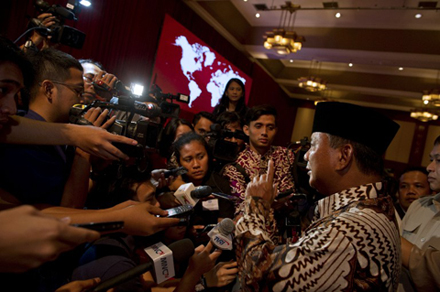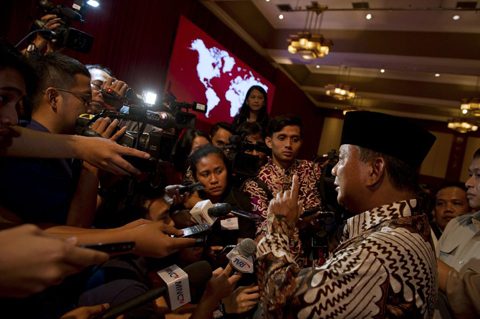
Prabowo Subianto (R) speaks with journalists after delivering a speech before the Indonesian Council of World Affairs in Jakarta on June 30, 2014. Photo by AFP.
Presidential candidate Prabowo Subianto responds to New Mandala’s Ross Tapsell regarding doubts about his commitment to democracy.
Recently at New Mandala we have published numerous articles questioning Presidential candidate Prabowo Subiantio’s commitment to democracy.
This issue has been of serious concern for many Indonesian and non-Indonesian academics whose expertise is Indonesian politics. This is largely the authors who write for us here at New Mandala.
These articles have not been written by authors who barrack for one party or another, but by Indonesian and non-Indonesian scholars who specialise in the academic study of Indonesia’s democracy and politics.
In a similar vein, yesterday, we published an article by Edward Aspinall and Marcus Mietzner which was entitled ‘Vote for me, but only once’, who expressed concerned about Prabowo’s comments about the electoral process. You can read a version of the article in Bahasa Indonesia here.
Yesterday evening, at an event in Jakarta where Prabowo spoke on foreign policy to an audience of supporters, diplomats, foreign media, and international relations students (among others), I was fortunate enough to ask him to clarify his remarks on democracy, as reported in Kompas, and its longevity under his possible presidency.
Following is his response, which was given fully in English.
—-
“I think sometimes or many times my comments have been taken out of context, or not in the complete version. I was asked in that session; that was a session concerning culture. I was asked by the delegation, a senior cultural figure in Indonesian society. He asked me what my opinion was, because in our national ideology – Pancasila – the wording of the clause to describe our version of democracy, we call it kerakyatan [meaning government by the people, for the people] – in the version kerakyatan is guided by what we call hikmah melalui permusyaratan perwakilan [short hand interpretation for a reference for the Fourth Principle of Pancasiila], consultative discussions by representation.
“So the direction of the question was, that many in Indonesian social and cultural leaders feel that basically our version of democracy should emphasise more on consultative consensus building through representation, so basically the essence is that democracy in our original constitution actually is more in line with Westminster Parliamentary democracy. This was the general direction of their thought.
“It’s not democracy versus authoritarian government. I sort of sense where you want to lead this question. Because I am being created as somebody who is anti-democracy. That I want authoritarian government. I want to go back to the New Order! (laughs and applause from audience). Please be assured. I am a democrat (applause). I believe in democracy. I was a soldier. I was a professional soldier. And I swore an oath to the Indonesian constitution to protect the constitution of the Republic. So I always uphold the constitutional power. That’s why I’m in politics. I’ve been politics already for what – nearly ten years? This is my third general election. So I do it the hard way. I don’t go assemble tanks and take over Parliament House, no haha (laughs from audience; more applause).
“Do you know why? Because I know the Indonesian people, and I know the Indonesian army, they are the people’s army. They come from the villages. They are children of the farmers. They are children of the poor. So… ah… no, it’s just the version of democracy.
“When I see India, 1.2 billion people, the kind of decisions made. It seems a bit more cheaper.
“Our version of democracy is very expensive. Believe me I know it [laughs from audience]. So have to learn from Europe, from the Netherlands, from the UK, we want to learn from India, we want to learn from other countries, how to carry out democracy that is consistent with our economic means, number one.
“Number two, there is the danger of corruption. Our democratic process is in danger of being hijacked. I have said that many times. For instance, our bupati, which is our district officer or regent. The salary of a bupati is around 6 million rupiah – $600 USD. Something. Now with the rupiah depreciating it is now what 500 USD? If you ask all the bupatis who won the election how much they spent on the election campaign, they will spend roughly in Java around at least 1.5 million USD. I know because one of my candidates reported to me that he spent 1.3 million USD and he lost the election. He lost the election! I think he lost it to Golkar (laughs from audience as Prabowo looks at Aburizal Bakrie in audience).
“I’m talking practically. So it’s not the concept of democracy. We are convinced we are carrying out democracy. I am going there before the people, before everybody. So there is no hesitation on our part. I was just commenting that the original concept of our founding fathers is actually more towards Westminster parliamentary democracy. He who wins the legislative election, will, you can get majority rule in parliament, you are automatically chief of the executive. In our opinion it could be cheaper and less vote buying etc etc etc. So that was the context of my comments, not that I proposing to cut direct elections, no. If I become elected I get elected by direction elections, that I agree, that I accept.
“But I told our friends in the Coalition, the Indonesian leaders must gather together and look for a new consensus, how to devise a system that is still democratic, that still represents the will of the people, but that is affordable. That we don’t create the conditions for rampant corruption. How can a bupati with a salary of 500 USD – he has to pay back his election campaign costs of 1.5 million USD?
“What happens usually is, he will be beholden to financiers. And who are these financiers? They could be …. ahh …. they could be drug lords. Yes? They could be drug lords. They could be gangsters. Mafia. Who has the money to back candidates around Indonesia in the scale of one billion? Or, he has a strategy. The minute he becomes bupati, he will plunder the budget of the region, which is what usually happens.
“The figures are also a bit disheartening. I don’t know if I should mention it because I think we are on television. But I think the number of bupatis that are facing legal problems is something in the order of about 30 per cent. Thirty per cent of all bupatis are facing indictment because of corruption.
“So that is my answer to you sir, I hope it satisfies you.
“But no I am not proposing going back to any form of undemocratic system. It’s way past us. Our people are already comfortable with democracy. They like to scrutinize all their leaders. And they like to grill us. They like to …‘fit and proper test’. Everything they will check, everything, believe me. Tomorrow I have to declare all my assets, they will check how many goats I have, even.”
Ross Tapsell is a lecturer at the Australian National University’s College of Asia and Pacific and a co-editor of New Mandala’s Indonesian election coverage. Click here to read Marcus Mietzner and Ed Aspinall’s analysis of Prabowo’s response.
 Facebook
Facebook  Twitter
Twitter  Soundcloud
Soundcloud  Youtube
Youtube  Rss
Rss 